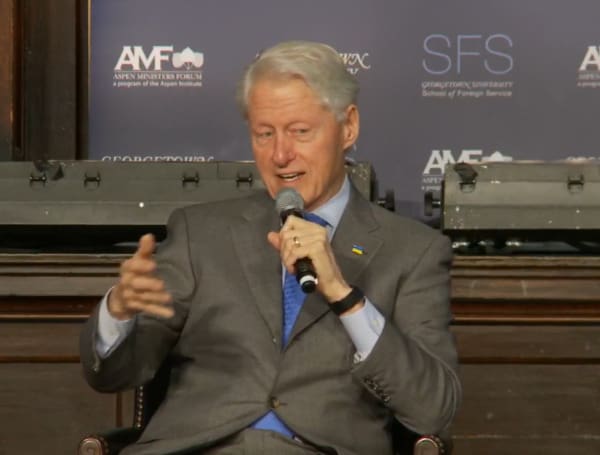by Katelynn Richardson, DCNF, Former President Bill Clinton Donald Trump cited a 2012 lawsuit against former President Bill Clinton involving his
Donald Trump cited a 2012 lawsuit against former President Bill Clinton involving his “sock drawer” tapes as a defense against his indictment on Tuesday, but those connected to Clinton’s case disagreed whether that legal reasoning would hold up in court.
The case stems from 79 late-night interviews historian Taylor Branch conducted with Clinton between 1993 and 2001, which included, along with the president’s thoughts on political events of the day, discussions of military involvement in Haiti, his side of phone conversations with foreign leaders and multiple phone calls with senators.
After Judicial Watch sued to obtain the tapes under the Presidential Records Act, a federal court ruled in 2012 that they were personal records not subject to request.
In the news: Trump Still On Top With Florida Gov. DeSantis Holding Second Place In Polls
During remarks following his court appearance on Tuesday, Trump said the decision in this case means he had “every right” to take the documents as the president has “unconstrained authority to make decisions regarding the disposal of documents.”
Michael Bekesha, a Judicial Watch senior attorney who litigated the “sock drawer” case, agrees that the 2012 ruling means Trump has discretion to designate records as personal under the Presidential Records Act.
“According to the then- Obama Justice Department and the federal court in D.C., the president has the sole responsibility to designate records as personal or presidential, and it is not the role of the Archives, Justice Department or even the courts to second guess that decision,” Bekesha told the DCNF.
“Since the President is completely entrusted with the management and even the disposal of Presidential records during his time in office, it would be difficult for this Court to conclude that Congress intended that he would have less authority to do what he pleases with what he considers to be his personal records,” Judge Amy Berman Jackson wrote in the ruling.
In the news: Trump Raises $6.6 Million Post Arraignment In Show Of ‘Steadfast Support’
Branch, however, told the DCNF that the tapes were closer to “a diary kept by Clinton” than government documents. He said they were “never processed by the government” and not considered “classified documents,” despite their contents.
“Look, I don’t want to make it sound like this is all [innocent stuff,]” he said. “He talked about ordering cruise missile strikes to try to kill Osama bin Laden. If there were a government document about that, it may have been classified at the time. But we didn’t have any classified documents. All I recorded and left on those tapes is what he said.”
Clinton’s intent was to create an oral history recording things he “couldn’t say in public” but “wanted to leave behind” after death, Branch said. He rejected the notion that Clinton’s case applies to Trump’s indictment.
“They’re trying to invoke an argument that’s already lost,” Branch told the DCNF. “I think it’s pathetic that they are trying to say that they have a winning argument that’s already been laughed out of court.”
Trump was charged with 31 counts of alleged violation of the Espionage Act, or “the willful retention of national defense information,” as well as one count of “conspiracy to obstruct Justice,” one count of “withholding a document or record,” one count of “corruptly concealing a document or record,” one count of “concealing a document in a federal investigation,” one count of “a scheme to conceal” and one count of “false statements and representations,” according to the indictment.
In the news: Nancy Pelosi Claims Putin ‘Feared’ Hillary Clinton In 2016
If the documents were covered under the Presidential Records Act, the government’s raid on Mar-a-Lago in search of records “should never have happened” and the charges under the Espionage Act should not have been brought, Bekesha noted in a Wall Street Journal op-ed this week.
Ethics and Public Policy Center Distinguished Senior Fellow and Antonin Scalia Chair in Constitutional Studies Ed Wheelen countered this argument on Twitter, arguing the scope of the Presidential Records Act doesn’t include “agency records.”
“The classified materials that Trump is alleged to have retained would not fall within the Act’s narrow definition of personal records,” Wheelen told the DCNF. “The 2012 ruling has nothing to do with the sitting president’s general authority over classified materials.”
Bekesha, responding to the criticism, told the DCNF the argument “makes little sense.”
“The argument that agency records received by the president remain the property of the agency makes little sense,” he said. “They aren’t library books that have to be returned to the agency after three weeks. The record maintained at the agency is an agency record and the copy received by the president can be designated, pursuant to the PRA, as he so chooses.”
Missouri attorney general candidate Will Scharf and Article III Project founder Mike Davis have echoed similar ideas: prosecution under the Espionage Act doesn’t hold up if the documents are personal records.
“If [Trump] thought these boxes were his Personal Records, he may have believed that [National Archives and Records Administration] simply had no right to receive them at all,” Scharf wrote on Twitter. “Meaning that he did not willfully withhold anything from an official he knew had the right to receive them. Because he didn’t believe that anyone had the right to receive them.”
Android Users, Click To Download The Free Press App And Never Miss A Story. Follow Us On Facebook and Twitter. Signup for our free newsletter.
We can’t do this without your help; visit our GiveSendGo page and donate any dollar amount; every penny helps.

